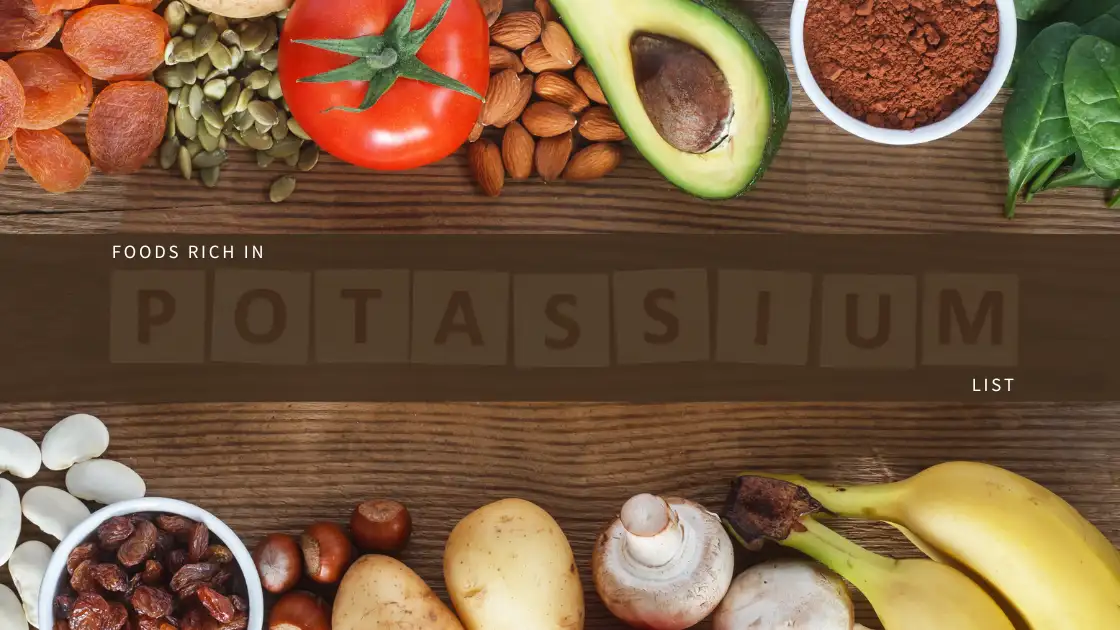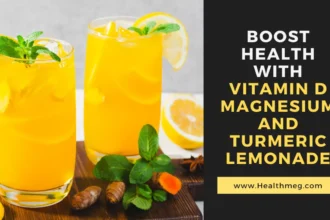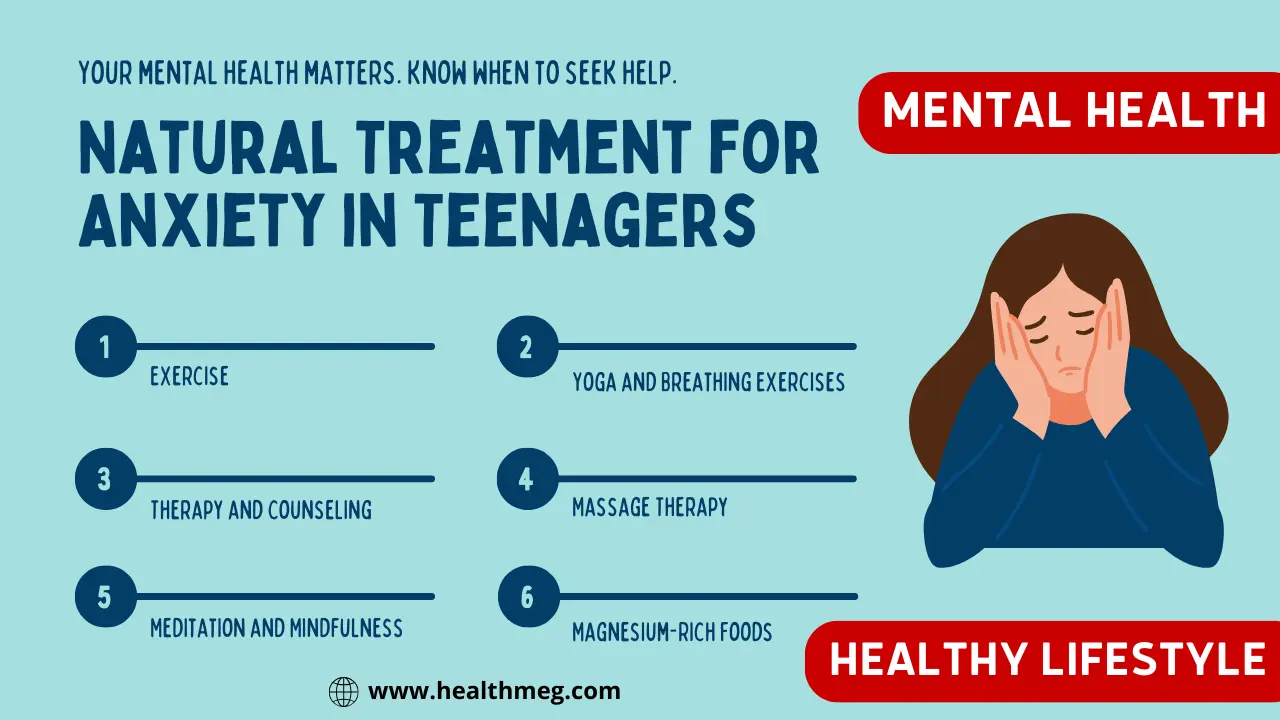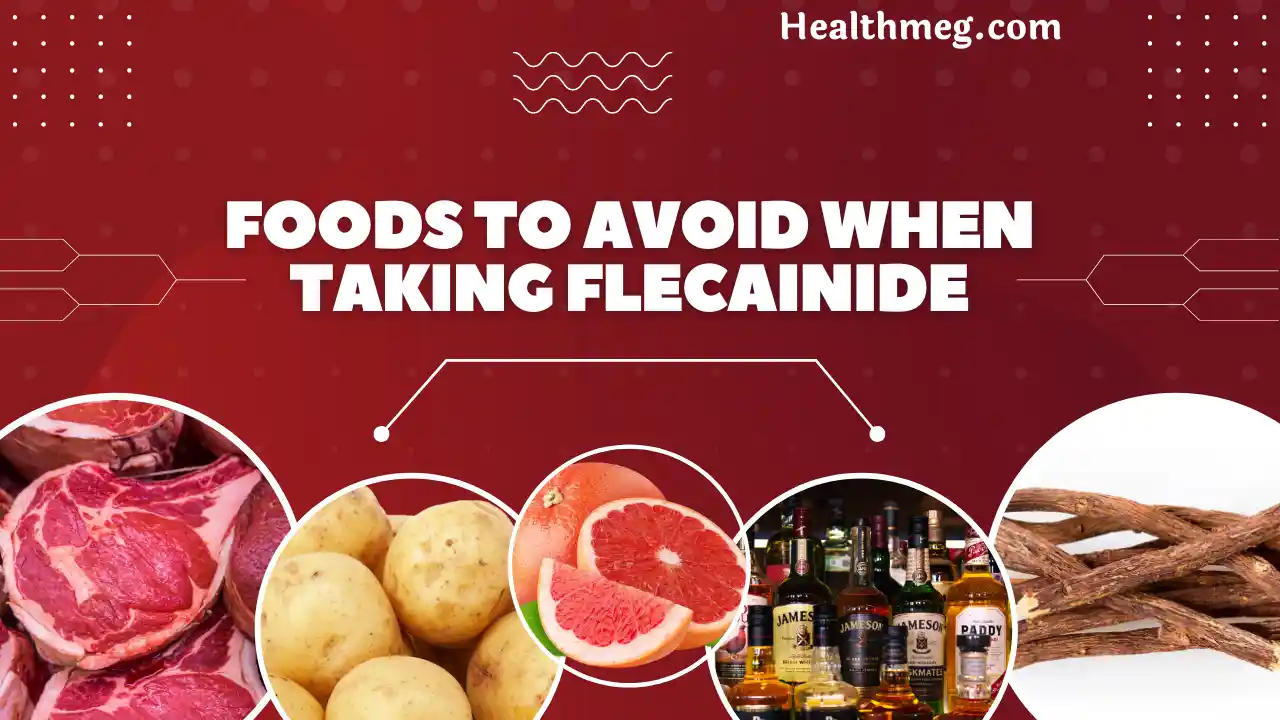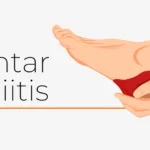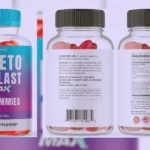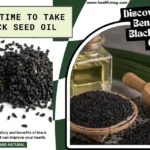Discover the ultimate Foods Rich in Potassium List: Your comprehensive guide to the Top 40+ potassium-rich foods for a healthier diet. Unlock the secrets to a balanced and nutritious lifestyle. The importance of potassium comes from its function in controlling or maintaining blood pressure, which is vital (important) to our general health. Despite its tendency to be underappreciated, this nutrient (Potassium) has a profound effect on our health.
In this complete post or article, we’re going to highlight potassium, beginning with an in-depth analysis of its origins. To help you include more foods high in potassium in your diet, we’ve put together a list of over 40 foods. Not only that, but we’ll also discuss low-potassium foods and provide some useful advice to make sure you’re getting adequate of this important vitamin (Potassium) in your regular meals. Now let’s explore the world of foods high in potassium list and learn how they might help or aid you in becoming healthier.
Do read the People Also Ask (FAQs) about this topic.
Introduction
For the human body to function properly, potassium is an important mineral. It aids in the regulation of nerve messages, muscular contractions, and fluid homeostasis. In addition to lowering blood pressure and heart disease risk, a diet high in potassium may also benefit.
Foods such as fruits, vegetables, legumes, certain types of protein, etc are high in potassium. Though there are numerous other options, bananas are a well-known source of potassium. For instance, the potassium content of one medium sweet potato is approximately 542 mg, which is more than that of one medium banana. It is important to know how potassium functions in the body and including foods high in potassium in your diet can assist in supporting general health and well-being.
Key Takeaways
- Potassium is an essential mineral that controls the body’s fluid balance, muscular contractions, nerve messages, etc.
- Potassium-rich diets have the potential to lower blood pressure and lower the risk of heart disease.
- Including foods high in potassium in your diet will help you feel better overall. These foods include fruits, vegetables, legumes, some types of protein etc.
Understanding Potassium
One mineral that is necessary for the body to operate correctly is potassium. Because it is an electrolyte, it aids (helps) in preserving the proper balance of minerals and bodily fluids. Potassium is required for nerve impulse transmission and the healthy operation of muscles, particularly the heart muscle.
Potassium is necessary in certain amounts for the body to operate correctly. For individuals, 2,500–3,000 mg of potassium should be consumed daily. The kidneys, which eliminate excess potassium in the urine, control the body’s potassium levels.
High blood pressure can result from eating too little potassium in the diet, which helps to regulate blood pressure. In addition, potassium may help prevent osteoporosis and lower the incidence of kidney stones.
Although potassium is a necessary mineral, excessive amounts can be dangerous. Heart issues, paralysis, weakness of the muscles, etc. can all be brought on by high blood potassium levels. It is recommended that those with kidney disease or other medical disorders consult their physician before using potassium supplements.
Bananas, oranges, cantaloupe, honeydew, apricots, grapefruit, cooked spinach, cooked broccoli, potatoes, sweet potatoes, avocados, tomatoes, yoghurt, etc. are a few foods high in potassium. Additional potassium-containing foods include beef, pork, chicken, fish, etc.
To make sure that the body gets the nutrients it needs, it’s very critical (important) to maintain a balanced diet that consists of a variety of foods. If someone is worried about how much potassium they are consuming, they should consult a trained dietician or their physician.
Why Is Potassium Important?
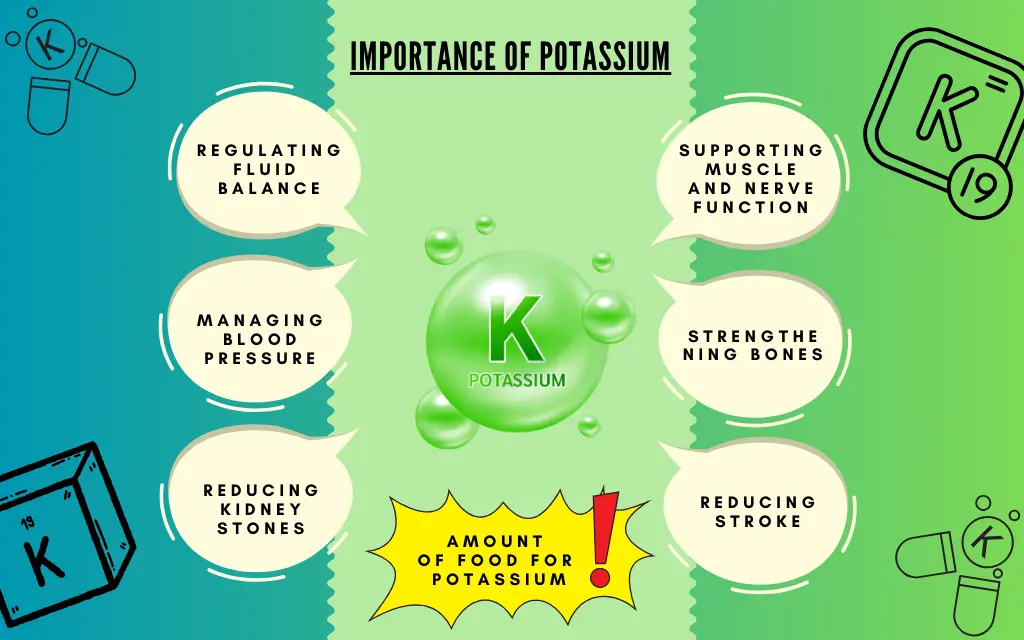
Potassium is a mineral and electrolyte that is essential for overall health. It has several vital functions, including:
- Regulating fluid balance
- Supporting muscle and nerve function
- Managing blood pressure
- Strengthening bones
- Reducing kidney stones
- Reducing Stroke
- Amount of food for Potassium
- Regulating fluid balance – Potassium helps control the amount of fluid stored in cells and blood volume. It works with sodium to regulate fluid balance.
- Supporting muscle and nerve function – Signals sent between your brain and muscles rely on potassium to help enable movement. It also helps reduce muscle cramping during exercise.
- Managing blood pressure – Potassium helps blood vessels dilate (widen), which helps lower blood pressure levels. This may reduce your risk of heart disease.
- Strengthening bones (Reducing Osteoporosis) – Along with calcium, potassium helps prevent bone loss as you age and reduces the risk of osteoporosis.
- Reducing kidney stones – Getting enough potassium may help reduce the buildup of calcium in the kidneys, lowering your risk of painful kidney stones.
- Reducing Stroke – Higher potassium intake helps in reducing Stroke.
- Amount of food for Potassium – The recommended daily intake for potassium is 4,700mg, but most people in the U.S. only get around half that amount. Potassium deficiencies are rare, but not getting at least 2,600mg per day long-term can lead to low potassium blood levels (hypokalemia). Symptoms of hypokalemia include:
- Muscle cramps or weakness
- Fatigue
- Constipation
- Abnormal heart rhythms
- High blood pressure
To optimize your potassium intake, include a variety of potassium-rich foods as part of a balanced diet. Keep reading for a detailed list of foods high in potassium.
The Role of Potassium in Blood Pressure Management
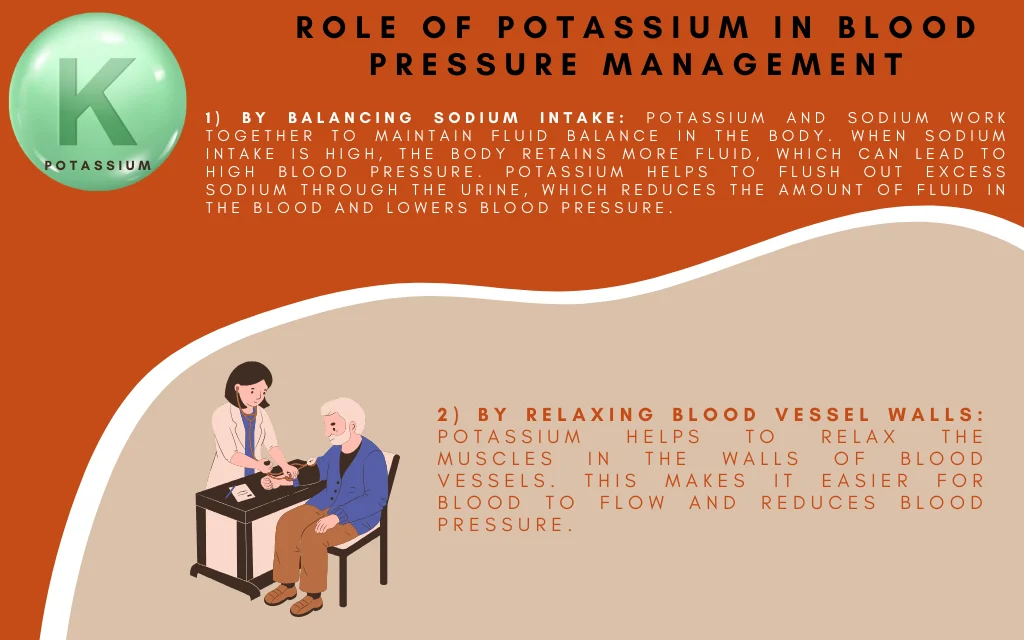
One important mineral that is necessary for sustaining appropriate blood pressure levels is potassium. An important risk factor for heart disease and stroke is high blood pressure also known as hypertension. Millions of individuals worldwide suffer from this widespread ailment.
According to research, consuming more potassium can both lower blood pressure in those who already have it and assist in lessening the risk of acquiring high blood pressure. One major cause of high blood pressure is the impact of sodium on the body, which potassium helps to regulate.
A high sodium level causes the body to retain water, which raises blood pressure and dilates blood vessels. To counterbalance this impact, potassium encourages the outflow of sodium through urine, which lowers blood pressure and volume.
Potassium not only affects sodium levels but also relieves blood vessel wall tension, which lowers blood pressure even further.
Fruits, vegetables, whole grains, nuts, seeds, lean meats, etc. are among the foods high in potassium. The following are a few of the top potassium sources:
- Bananas
- Sweet potatoes
- Spinach
- Avocados
- Yoghurt
- Salmon
- Beans
- Tomatoes
- Oranges
It’s crucial to remember that, even while eating more potassium can help control blood pressure, it can’t replace other lifestyle adjustments like cutting back on sodium, keeping a healthy weight, and getting regular exercise.
In a nutshell, potassium is a very important (vital) factor for controlling blood pressure and lowering the risk of heart disease. Healthy blood pressure levels and general health can be maintained and enhanced by including foods high in potassium in the diet.
Top Dietary Sources of Potassium
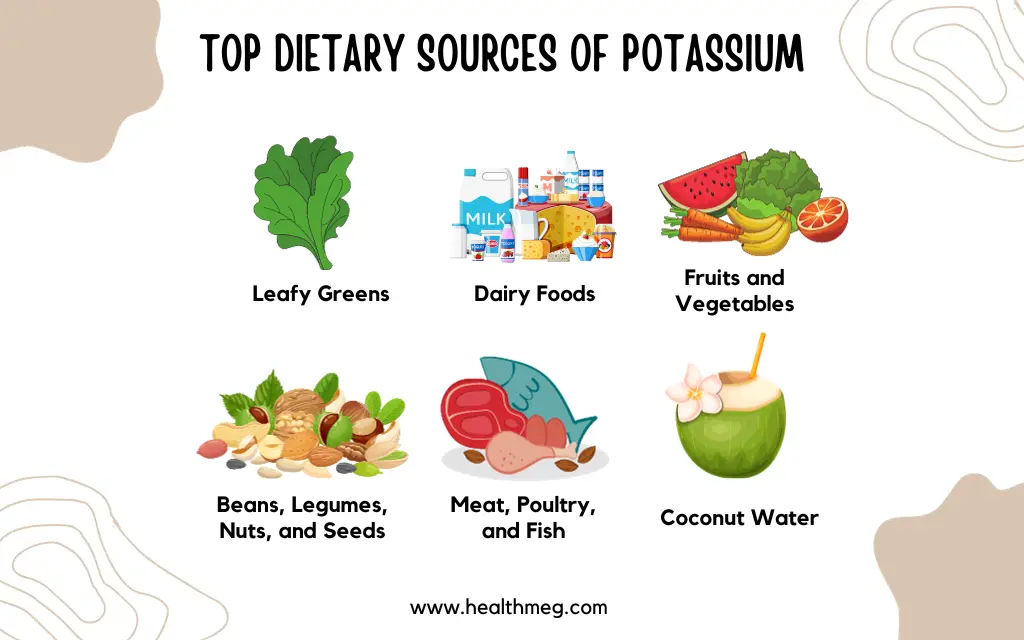
Many foods provide potassium, but some are much better sources than others. These foods have at least 200 mg of potassium per standard serving.
- Leafy Greens
- Dairy Foods
- Fruits and Vegetables
- Beans, Legumes, Nuts, and Seeds
- Meat, Poultry, and Fish
- Coconut Water
Leafy Greens
Greens are some of the best sources of dietary potassium. For example:
- 1 cup (30 grams) of raw spinach provides 167 mg or 5% of the RDI for potassium.
- 1 cup (190 grams) of cooked spinach packs a whopping 839 mg or 21% of the RDI.
- Swiss chard, kale and beet greens are also excellent sources, providing 9–13% of the RDI per cooked cup.
- Leafy greens like spinach and kale are loaded with potassium, as well as vitamins A and C, antioxidants, and beneficial plant compounds like nitrates.
- Aim to include greens at either lunch or dinner each day. Using them is an easy way to increase your potassium intake.
Dairy Foods
Dairy products, such as milk and yoghurt, are high in potassium:
- 1 cup (245 grams) of nonfat plain yoghurt has over 500 mg or 12% of the RDI.
- 1 cup (240 ml) of low-fat milk packs 366 mg or 9% of the RDI.
- Other dairy items like cheese and butter provide smaller amounts ranging from 52–82 mg per ounce (28 grams).
- Low-fat dairy items like yoghurt and milk additionally provide lots of calcium, protein, and vitamin B12.
Fruits and Vegetables
Many fruits and vegetables are good or excellent sources of potassium:
- Baked potatoes are potassium all-stars, with a large potato containing 950 mg or 25% of the RDI. Potatoes provide even more potassium when eaten with the skin.
- 1 medium banana packs 422 mg or 11% of the RDI.
- 1 cup (150 grams) of cooked beetroot contains 518 mg or 13% of the RDI.
- Raisins provide 322 mg or 8% of the RDI per 1 ounce (28 grams).
- Prunes have 267 mg or 7% of the RDI per ounce (28 grams).
- Large tomatoes offer 292 mg or 8% of the RDI per medium fruit.
- Other high-potassium fruits and vegetables include cantaloupe, honeydew, orange juice, cooked greens like kale, and winter squash.
- Aim to consume 4–5 servings of fruits and vegetables daily to maximize potassium intake.
Beans, Legumes, Nuts, and Seeds
Plant-based protein foods are stellar sources of potassium:
- 1 cup (172 grams) of cooked white beans provides 1004 mg or 25% of the RDI.
- 1 cup (190 grams) of cooked lentils packs 731 mg or 18% of the RDI.
- Roasted soynuts contain 676 mg or 17% of the RDI per 1 ounce (28 grams).
- Almonds provide 310 mg or 8% of the RDI per ounce (28 grams).
- Beans, lentils, nuts, and seeds provide plenty of fibre, plant protein, magnesium and iron in addition to potassium.
- Incorporate a few servings per day of these plant proteins to optimize your potassium intake.
Meat, Poultry, and Fish
Animal proteins including meat, poultry and fish aren’t as high in potassium as plant-based sources, but they still provide a decent amount:
- 85 grams (3 oz) of salmon contains 434 mg or 11% of the RDI.
- 85 grams (3 oz) of ground beef provides 348 mg or 9% of the RDI.
- 1 roasted chicken breast packs 256 mg or 6% of the RDI.
- Choose lean meats and fish as sources of potassium in addition to other vitamins and minerals.
Coconut Water
- Coconut water has exploded in popularity in recent years.
- This tropical beverage is naturally high in electrolytes like potassium.
- One cup (240 ml) of coconut water provides 600 mg or 15% of the potassium RDA.
Just keep in mind that coconut water is relatively high in calories with around 60 per cup.
40+ Foods Rich in Potassium List
Here are more than 50 of the top sources of dietary potassium, along with their serving size and potassium content. We’ve divided them into categories to make it easy to find potassium-rich foods you enjoy.
Fruits Rich in Potassium
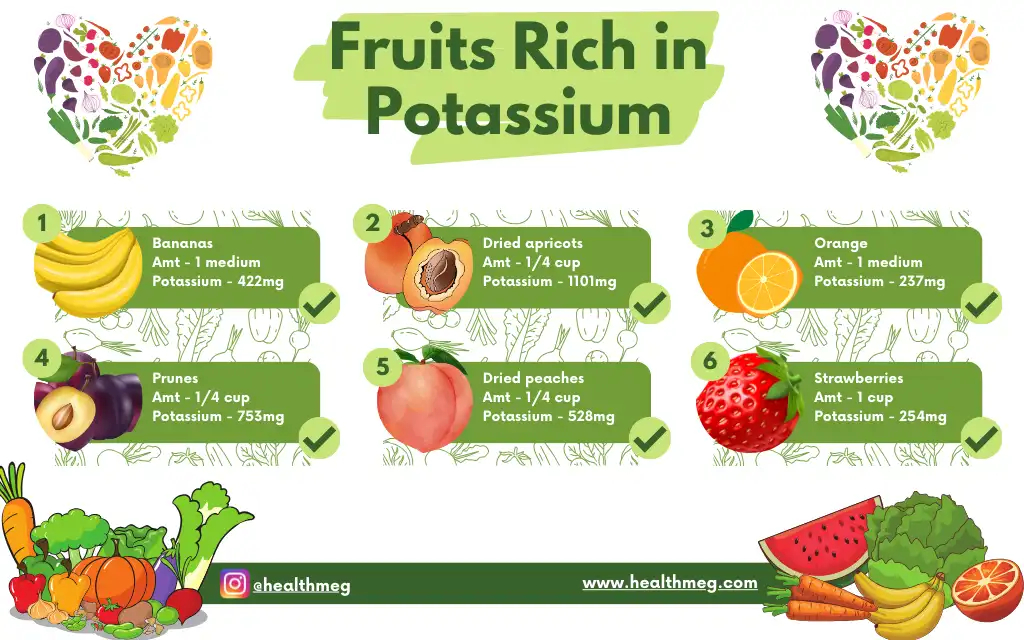
Fruits offer lots of nutrients along with their potassium punch. Those highest in potassium include:
| Fruits | Amount/Unit | Potassium(mg) |
| Bananas | 1 medium | 422mg |
| Dried apricots | 1/4 cup | 1,101mg |
| Prunes | 1/4 cup | 753mg |
| Raisins | 1/4 cup | 589mg |
| Dried peaches | 1/4 cup | 528mg |
| Cantaloupe | 1 cup cubed | 494mg |
| Honeydew | 1 cup cubed | 461mg |
| Orange | 1 medium | 237mg |
| Watermelon | 1 cup diced | 170mg |
| Strawberries | 1 cup | 254mg |
| Blueberries | 1 cup | 114mg |
Tip: Dried fruit condenses the nutrients, providing more potassium per serving than fresh varieties.
Vegetables Rich in Potassium

Vegetables are potassium superstars and most people don’t get enough. Great veggie choices include:
| Vegetables | Amount/Unit | Potassium(mg) |
| Baked potatoes | 1 medium | 941mg |
| Sweet potatoes | 1 medium baked | 542mg |
| Tomato sauce | 1/2 cup | 454mg |
| Beet greens | 1/2 cup cooked | 654mg |
| White beans | 1/2 cup cooked | 595mg |
| Lima beans | 1/2 cup cooked | 455mg |
| Avocados | 1 medium | 364mg |
| Carrots | 1/2 cup sliced | 303mg |
| Broccoli | 1/2 cup cooked | 288mg |
| Spinach | 1/2 cup cooked | 286mg |
| Lentils | 1/2 cup cooked | 365mg |
Tip: Potatoes and beans are among the most potent sources, providing nearly 1/10 of your daily potassium in one serving.
Dairy Foods High in Potassium
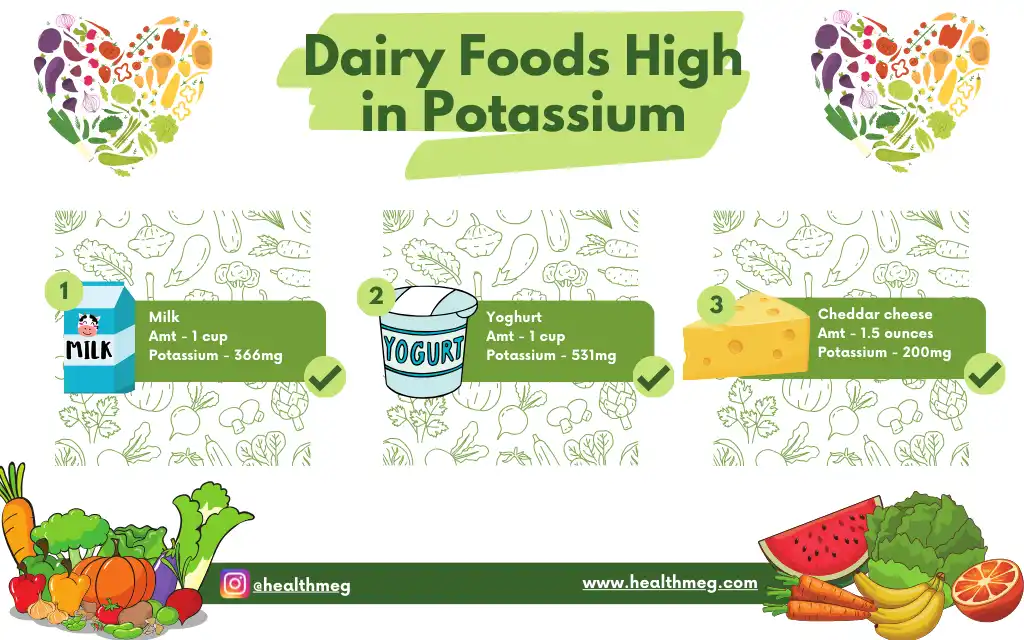
Dairy products are an unexpected source of potassium. Those highest in potassium are:
| Dairy Foods | Amount/Unit | Potassium(mg) |
| Milk | 1 cup | 366mg |
| Yoghurt | 1 cup | 531mg |
| Cheddar cheese | 1.5 ounces | 200mg |
Tip: Opt for low-fat or nonfat dairy items to avoid extra saturated fat.
Meat and Seafood Rich in Potassium
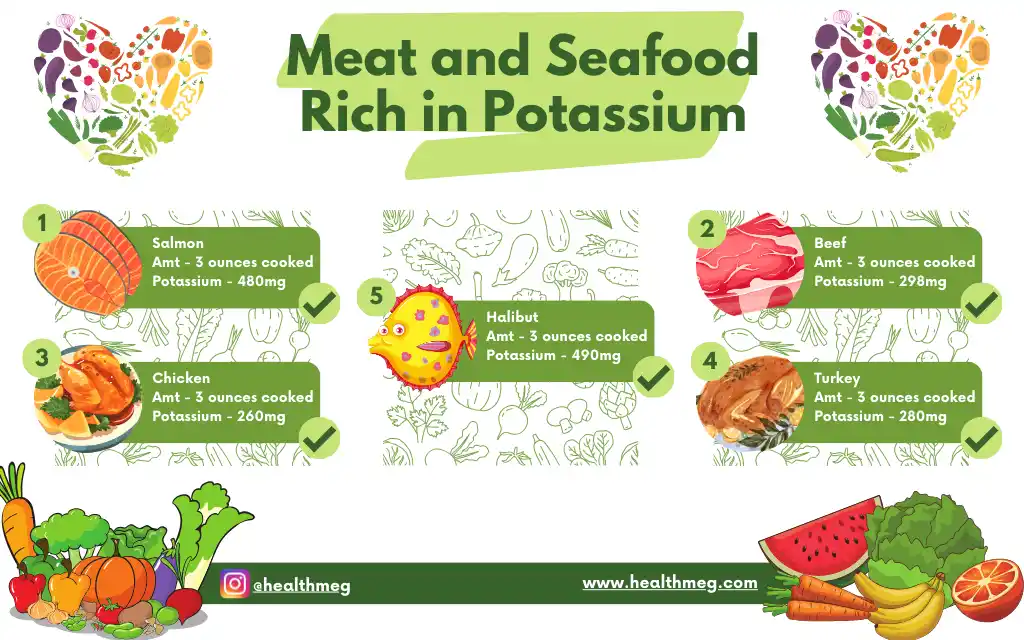
While not as high in potassium as plant foods, some meats and seafood provide a decent amount:
| Meat and Seafood | Amount/Unit | Potassium(mg) |
| Salmon | 3 ounces cooked | 480mg |
| Halibut | 3 ounces cooked | 490mg |
| Beef | 3 ounces cooked | 298mg |
| Chicken | 3 ounces cooked | 260mg |
| Turkey | 3 ounces cooked | 280mg |
Tip: Lean meats like poultry, fish, and 90% lean beef are your best protein options.
Nuts, Seeds and Peanut Butter
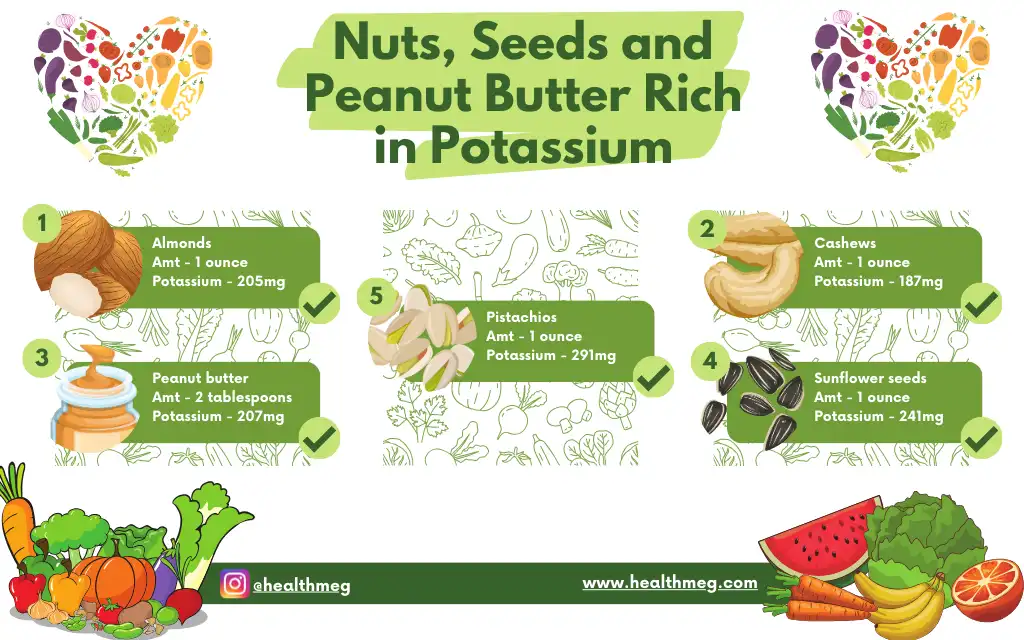
Nuts, seeds and nut butter deliver a perfect potassium-packed crunch:
| Nuts, Seeds and Peanut Butter | Amount/Unit | Potassium(mg) |
| Almonds | 1 ounce | 205mg |
| Pistachios | 1 ounce | 291mg |
| Cashews | 1 ounce | 187mg |
| Peanut butter | 2 tablespoons | 207mg |
| Flax seeds | 2 tablespoons | 223mg |
| Sunflower seeds | 1 ounce | 241mg |
Tip: Enjoy these in moderation since they’re high in calories.
Other Potassium-Rich Foods
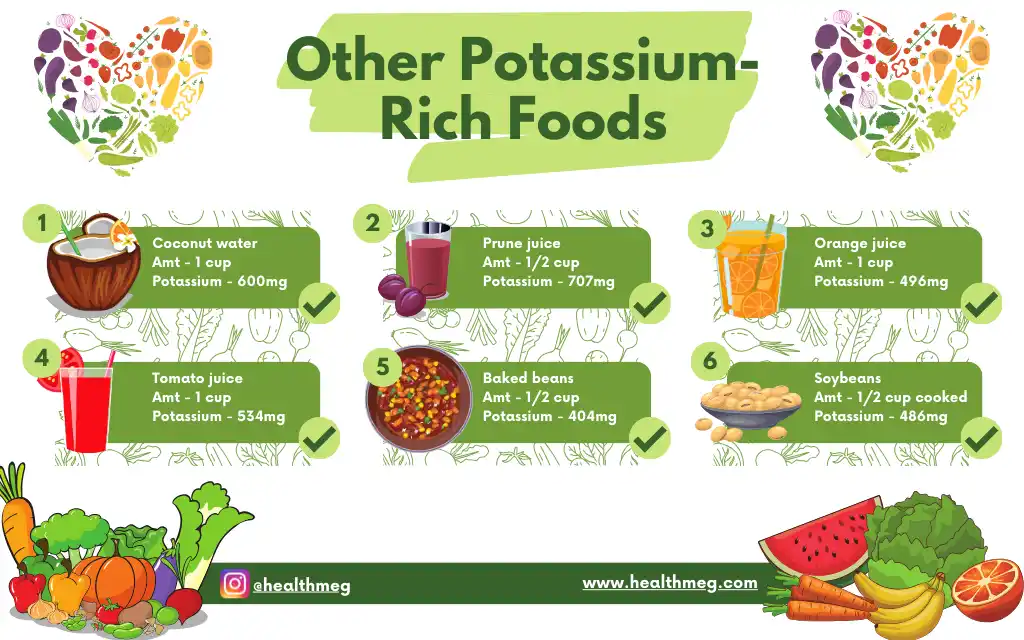
Rounding out our list of potassium all-stars are:
| Other Potassium-Rich Foods | Amount/Unit | Potassium(mg) |
| Coconut water | 1 cup | 600mg |
| Prune juice | 1/2 cup | 707mg |
| Orange juice | 1 cup | 496mg |
| Tomato juice | 1 cup | 534mg |
| Baked beans | 1/2 cup | 404mg |
| Kidney beans | 1/2 cup cooked | 403mg |
| Soybeans | 1/2 cup cooked | 486mg |
| Lentil soup | 1 cup | 370mg |
Tip: Natural sources like coconut water, juice and beans are healthier potassium options than supplements.
Low-Potassium Foods and Diet
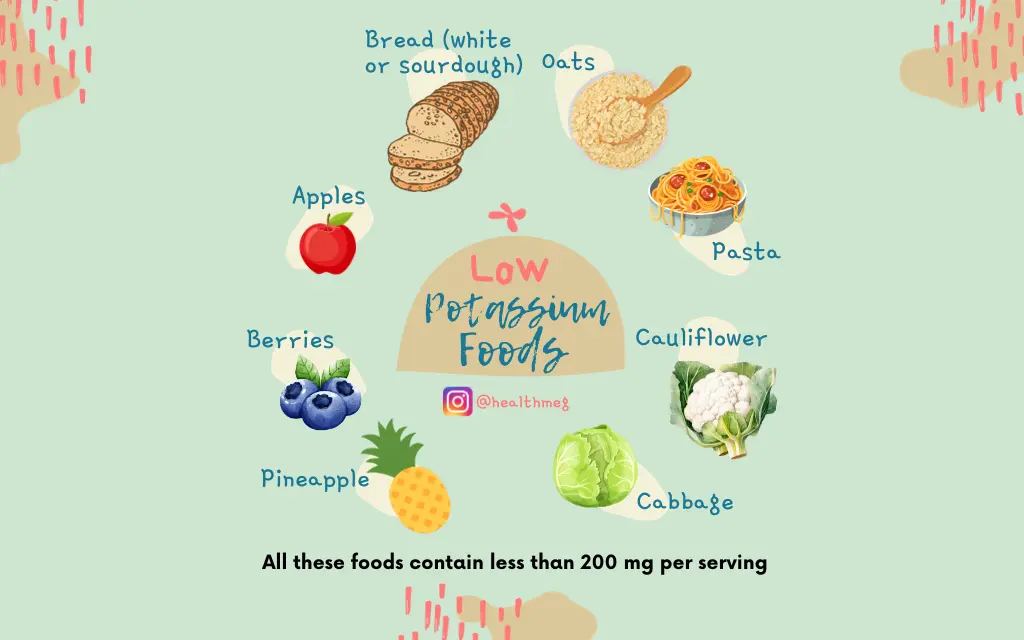
Knowing which foods to limit or stay away from is crucial for those with kidney disease or other medical conditions requiring a low-potassium diet. Less than 2,000 milligrams of potassium per day is considered a low-potassium diet.
Foods low in potassium that can be a part of a balanced diet include:
- Apples
- Berries
- Grapes
- Pineapple
- Cabbage
- Cauliflower
- Broccoli
- Carrots
- Green beans
- Lettuce
- Onions
- Peppers
- Zucchini
- Bread (white or sourdough)
- Rice
- Pasta
- Oats
- Cornflakes
- Butter
- Margarine
Remember that even foods low in potassium should be taken in moderation. Consuming excessive amounts of any food can increase one’s consumption of potassium. Furthermore, diets high in sodium can be detrimental (harmful) to individuals with kidney disease, even if they are low in potassium.
Those following a low-potassium diet might flavour their food with herbs and spices or salt substitutes to reduce sodium intake. But before utilizing salt alternatives, it’s crucial to see a doctor because some of them could be high in potassium.
For those with kidney disease or other medical conditions, a low-potassium diet can be safe and manageable with proper planning and guidance. Nevertheless, it can be difficult to follow.
Tips to Get More Potassium in Your Diet
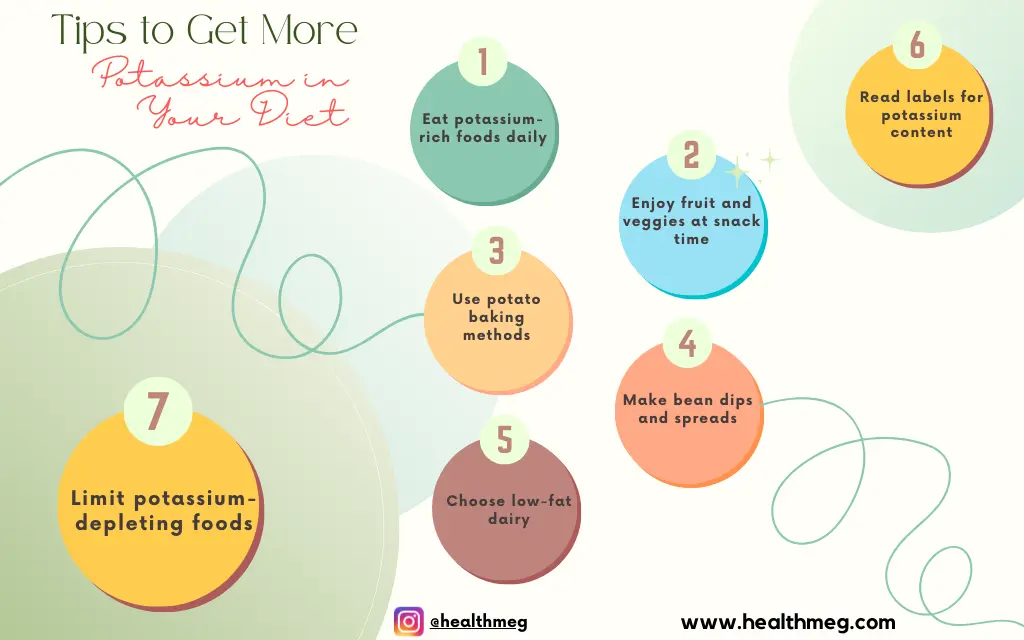
Now that you know the many food sources of potassium, here are some tips to help you eat more high-potassium foods:
- Eat potassium-rich foods daily – Include several excellent or good sources of potassium at each meal.
- Enjoy fruit and veggies at snack time – Fresh, frozen or unsweetened canned produce makes great potassium-filled snacks.
- Use potato baking methods – Baking, mashing or roasting potatoes keeps more potassium than boiling.
- Make bean dips and spreads – Blend beans into flavorful dips like hummus for an easy potassium boost.
- Choose low-fat dairy – Get potassium from yoghurt, milk and cheeses more often.
- Read labels for potassium content – Seek out packaged foods with at least 350mg of potassium per serving.
- Limit potassium-depleting foods – Consume fewer processed carbs, sugars and fast foods low in potassium.
Conclusion
Potassium is a key electrolyte that’s vital for heart health, and muscle and nerve function. Most people don’t hit the recommended 4,700 mg potassium intake. For that, you need to focus on incorporating more potassium-rich foods like leafy greens, dairy, fruit, beans, lentils, nuts and seeds. Boosting your potassium levels can lower blood pressure, prevent kidney stones, build muscle and keep your body functioning optimally.
People Also Ask (FAQs)
Q) What are the top 10 foods high in potassium?
A) The top 10 foods high in potassium include sweet potatoes, white beans, spinach, avocado, dried apricots, salmon, acorn squash, yoghurt, mushrooms, and bananas. All of these foods are high in potassium and can help the body maintain the proper electrolyte balance.
Q) How much potassium is in a banana?
A) A medium-sized banana contains approximately 400-450mg of potassium. Although bananas are an excellent source of potassium, this vital (important) nutrient is also present in a lot of other foods.
Q) Are tomatoes a good source of potassium?
A) Yes, tomatoes are a good source of potassium. One medium-sized tomato contains approximately 292mg of potassium. However, other foods contain higher levels of potassium, such as sweet potatoes, white beans, spinach, etc.
Q) What are the benefits of consuming foods rich in potassium?
A) Eating foods high in potassium can improve or boost heart health, lower the risk of stroke, regulate blood pressure, strengthen bones, etc. among other health advantages. Additionally necessary for healthy neuron and muscle function is potassium.
Q) What are some potassium-rich fruits?
A) Some potassium-rich fruits include bananas, avocados, cantaloupe, honeydew melon, oranges, kiwi, dried apricots, etc. These fruits are all vital (important) sources of potassium and can help or aid in maintaining a healthy balance of electrolytes in the body.
Q) How can I increase my potassium level quickly?
A) To increase potassium levels quickly, one can consume foods high in potassium such as sweet potatoes, white beans, spinach, avocado, dried apricots, salmon, acorn squash, yoghurt, mushrooms, and bananas. There are potassium supplements available as well, but before taking any supplements, it’s advisable to speak with a healthcare or medical professional.
Q) Is vitamin K and potassium the same vitamin?
A) Mostly, Vitamin K and Potassium are frequently confused. As we all have read in our 9th or 10th class about potassium which is represented by symbol K in the periodic table, it is not the same essential nutrient for the body. Vitamin K is a vitamin that is also important for your body’s needs but it is a mineral, not a nutrient.
References
- National Institutes of Health (NIH): https://ods.od.nih.gov/factsheets/Potassium-HealthProfessional/
- Centres for Disease Control and Prevention (CDC): https://www.cdc.gov/salt/potassium.htm
- American Heart Association: https://www.heart.org/en/healthy-living/healthy-eating/eat-smart/sodium/potassium
- Harvard Health Publishing: https://www.health.harvard.edu/diseases-and-conditions/how-to-get-more-potassium
- USDA Food Composition Databases – The United States Department of Agriculture (USDA) provides a comprehensive database of food nutrient information, including potassium content. This is a trusted source for nutritional data.
